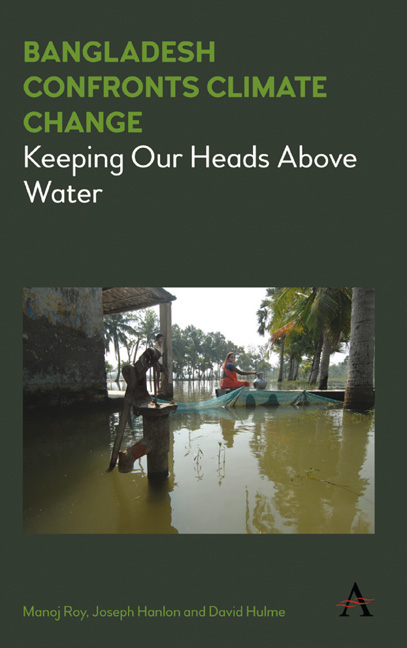Book contents
- Frontmatter
- Content
- List of Illustrations
- Abbreviations, Acronyms and Bangladeshi Terms
- Acknowledgements
- About the Authors
- Chapter One Actors, Not Victims
- Chapter Two How Will Climate Change Hit Bangladesh?
- Chapter Three Taking the Lead in Negotiations – and Moving Forward
- Chapter Four Sea Level Rise and the Vulnerable Coast – Where Farmers Know More than Engineers
- Chapter Five Saving Lives with Cyclone Shelters
- Chapter Six Living with Floods
- Chapter Seven Agronomists Keeping Ahead of Climate Change
- Chapter Eight No Climate Change Migrants – Yet
- Chapter Nine How Can the Privatized Megacity Cope with Climate Change?
- Chapter Ten Is Climate Change Only a Problem for the Urban Poor?
- Chapter Eleven Power – Political, Financial and Electrical
- Chapter Twelve Bangladesh on the Front Line of Climate Change
- Index
Chapter Eight - No Climate Change Migrants – Yet
Published online by Cambridge University Press: 22 July 2017
- Frontmatter
- Content
- List of Illustrations
- Abbreviations, Acronyms and Bangladeshi Terms
- Acknowledgements
- About the Authors
- Chapter One Actors, Not Victims
- Chapter Two How Will Climate Change Hit Bangladesh?
- Chapter Three Taking the Lead in Negotiations – and Moving Forward
- Chapter Four Sea Level Rise and the Vulnerable Coast – Where Farmers Know More than Engineers
- Chapter Five Saving Lives with Cyclone Shelters
- Chapter Six Living with Floods
- Chapter Seven Agronomists Keeping Ahead of Climate Change
- Chapter Eight No Climate Change Migrants – Yet
- Chapter Nine How Can the Privatized Megacity Cope with Climate Change?
- Chapter Ten Is Climate Change Only a Problem for the Urban Poor?
- Chapter Eleven Power – Political, Financial and Electrical
- Chapter Twelve Bangladesh on the Front Line of Climate Change
- Index
Summary
‘Climate Change Makes Refugees in Bangladesh – Bangladesh and Countries like It Are on the Frontline of Mass Migrations as a Result of Global Warming’ headlined Scientific American in 2009. However most of the people interviewed by author Lisa Friedman came from the southwest and had been forced to migrate due to waterlogging caused by the construction of dykes and polders (see Chapter 4) or due to cyclone Sidr.
There are no ‘climate change refugees’ in Bangladesh, because climate change has not yet had a noticeable impact and because the Bangladesh climate is so variable. There is a whole book reporting on temperature and rainfall change which finds that over 50 years there had been a slight decrease in winter temperatures in the northwest, and elsewhere there had been a slight increase. These changes are real but not yet noticeable. For example, in the northwest the year-to-year variation in the maximum winter temperature can be 2ºC or more; long-term data shows there is a decline in the maximum winter temperature in the northwest of 0.01– 0.03ºC per year, which is too small to be noticed.
Scientists and statisticians can already see the effects of climate change, but ordinary people do not, and it does not have any effect on a decision to migrate. Yet. But this country's hugely variable climate means the norm is cyclones, floods, heavy rain and droughts. As discussed in Chapter 2, climate change will have major impacts. The national census shows that 80 per cent of those who migrate to Dhaka do so to look for work or because of poverty; only 8 per cent move directly for environmental reasons (see Box 8.1). However, poverty and unemployment is often caused indirectly by environmental factors – floods and cyclones destroy houses, productive assets and jobs; when these cannot be replaced, people migrate. We use the term ‘environmental migrants’ for people who move, directly or indirectly, due to cyclone, flood, erosion and waterlogging. Bangladesh has had environmental migrants for centuries, although the number is probably rising as population growth pushes people to live in more marginal areas.
- Type
- Chapter
- Information
- Bangladesh Confronts Climate ChangeKeeping Our Heads above Water, pp. 101 - 110Publisher: Anthem PressPrint publication year: 2016



